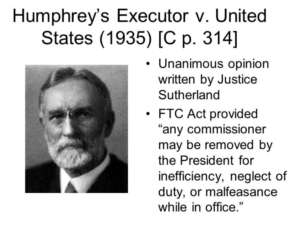Donald Trump has been firing Biden admin holdovers and has even threatened to replace Jerome Powell as Fed chairman – a move we would favor.
Whether Trump has this authority is unresolved. But in recent years the Supreme Court has inched towards restoring the president’s full power to remove executive branch officials – as the footnote in Trump’s excellent “You’re Fired!” letter to NLRB Democrats explains.
During a recent Federalist Society meeting, the legal experts agreed that the next mega issue for the Supreme Court to decide will be this one, as explained by Francis Menton:
Humphrey’s Executor is the key Supreme Court case addressing the following question: Can the President fire anybody and everybody in the federal bureaucracy whom he wants to fire, effective immediately, no questions asked? This is a rather important question…
Given that the Constitution vests all of the “Executive Power” in the President, aren’t such restrictions on his power unconstitutional?
This is where Humphrey’s Executor comes into the mix. The facts of the case arose in 1933 — early in Franklin Roosevelt’s first term as President — and the case was decided by the Supreme Court in 1935. Humphrey was a Commissioner of the FTC, appointed by prior President Herbert Hoover to a seven-year term, that would then continue throughout Roosevelt’s first administration. Roosevelt wanted to get rid of Humphrey, but the FTC statute at the time provided (as it still provides today) that Commissioners could only be removed for “inefficiency, neglect off duty, or malfeasance in office.” So Roosevelt just ignored the statutory restriction and fired the guy. Humphrey sued. (He died while the case was pending, and the case for his pay was then continued by his executor, which is why the case goes by the name of Humphrey’s Executor.)
The Supreme Court held, in one of its most bizarre opinions ever, that Humphrey was improperly fired and that his estate was entitled to its back pay… The Court’s logic turns on the idea that the power of an FTC Commissioner is not “executive” in nature, even though the Commissioners have the authority to execute and enforce the laws. The opinion makes no sense whatsoever. However, it has never been overruled, and stands today as Supreme Court precedent. I’ll be surprised if even the crazy liberals on today’s Supreme Court are ready to uphold this case.
We hope he’s right.

